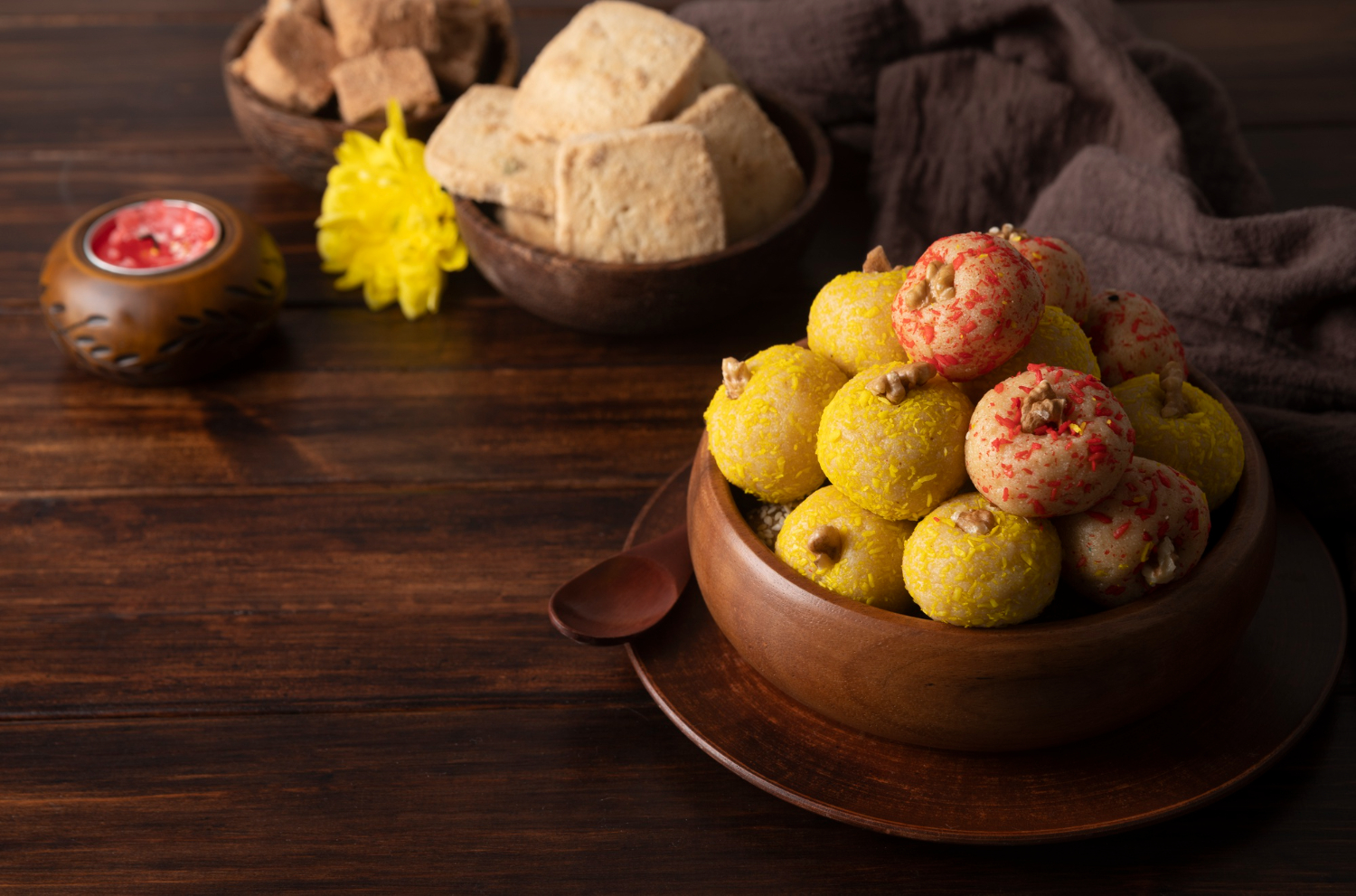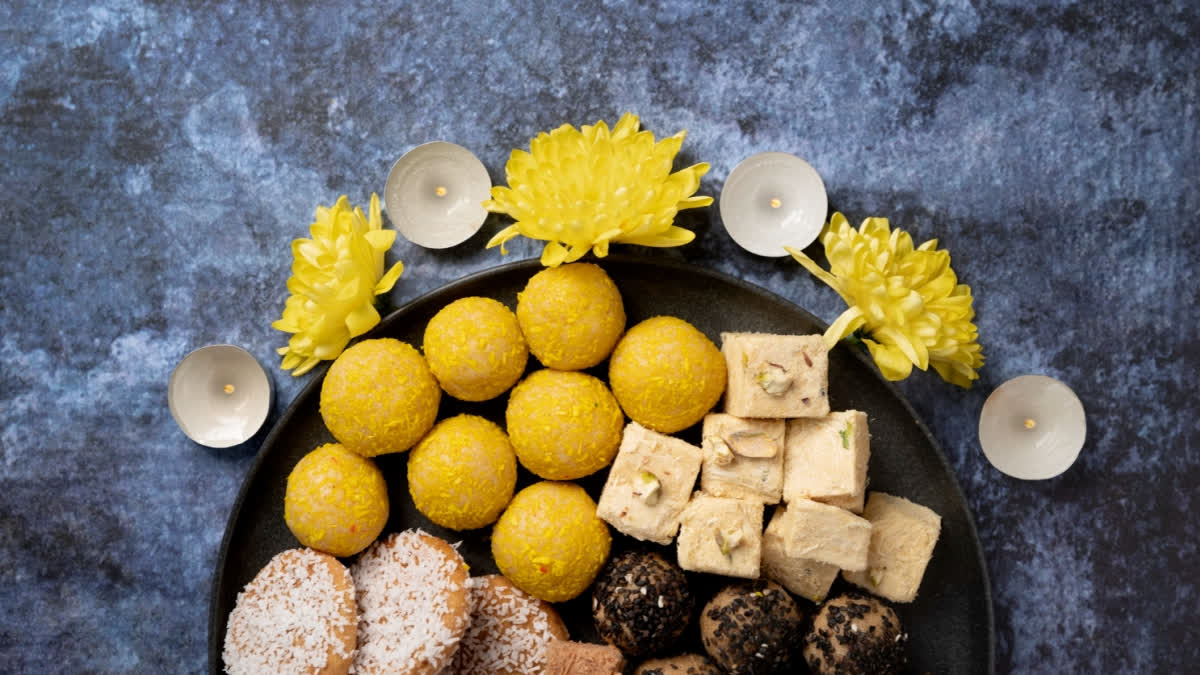10 Healthy Ways To Enjoy Diwali Sweets And Fried Snacks
Diwali is synonymous with lights, celebrations, and indulgent feasting. With every mithai box and spread of snacks comes the temptation to indulge a bit too much, leaving our bodies feeling sluggish by the end of the season. The festival of lights can often turn into a festival of calories, leaving your digestive system feeling overwhelmed. However, you don’t need to miss out on festive treats. With a few simple hacks, you can enjoy the best Diwali sweets and snacks while keeping your health in check.
Here are our easy, practical tips to eat sensibly and stay healthy during Diwali:
1. Savour, Don’t Overindulge
When it comes to Diwali treats, the key is moderation. Rather than indulging in large portions, practice mindful eating by savouring small servings. For sweets, stick to one piece at a time, taking the time to enjoy each bite. For fried snacks, limit yourself to a handful rather than multiple servings. By practicing portion control, you can still enjoy your favourite treats without overloading your system.
Smart tip: Choose smaller plates when serving yourself. Research shows that using smaller plates naturally encourages eating smaller portions, which can help prevent overeating.
2. Stay Hydrated To Beat Sugar Cravings
The excitement of Diwali can often lead us to neglect hydration, but water plays a crucial role in digestion and metabolism. Drinking enough water helps curb sugar cravings and prevents overeating. Start your day with a glass of warm water, and try to drink water between each meal or snack session. Herbal teas, coconut water, and nimbu paani are also great for keeping you hydrated and aiding digestion.

Smart tip: If you’re attending multiple gatherings, sip water between treats to keep yourself hydrated and reduce the likelihood of reaching for more sweets.
3. Snack on Protein-Rich Foods First
One way to avoid the temptation of endless sweets and fried snacks is to fill up on protein-rich foods before reaching for treats. Protein stabilises blood sugar levels, making you feel fuller for longer. Have a handful of almonds, a boiled egg, or some Greek yoghurt before heading to a Diwali party. This will help reduce cravings and prevent overeating.
Smart tip: Try a protein shake or a small bowl of moong dal chilla as a pre-party snack to keep your appetite in check.
4. Make Room For Fibre-Rich Foods
High-fibre foods like fruits, vegetables, and whole grains are your digestive system’s best friend during Diwali. Fiber aids digestion, prevents bloating, and can help you feel satisfied without overindulging in heavy snacks. If you’re hosting, add fibre-rich options to your spread, like vegetable sticks with hummus, fruit platters, or even a simple salad. And if you’re a guest, start with the fibre-rich options before diving into sweets and fried foods.
Smart tip: Include a bowl of fresh fruit with breakfast or as a mid-morning snack. Fruits like apples, pears, and pomegranates are high in fibre and make for a light, festive option.
5. Look For Natural Ingredients
Diwali sweets are often loaded with refined sugars, which can cause blood sugar spikes and crashes. Opt for treats made from healthier, natural ingredients like dates, jaggery, or nuts. Laddoos made with sesame seeds, coconut, and dates or chikkis made with peanuts and jaggery are excellent alternatives to sugar-laden sweets. These options not only satisfy your sweet tooth but also provide essential nutrients and energy.

Smart tip: Look for sweets made with low-glycaemic sweeteners, or make your own at home with honey, dates, or figs to control the ingredients.
6. Limit Sugary Drinks
Festive gatherings often include alcoholic beverages or sugary sodas, which add empty calories and lead to dehydration. Alcohol and sugary drinks also increase cravings for salty and fried snacks, leading to further unhealthy choices. Opt for healthier beverages like sparkling water with lemon, fresh juices without added sugar, or herbal teas.
Smart tip: If you choose to have an alcoholic drink, alternate each drink with a glass of water to stay hydrated and reduce overall intake.
7. Use Healthier Cooking Techniques
When preparing Diwali snacks at home, use healthier cooking methods to reduce calorie intake. Instead of deep-frying, consider baking or air-frying snacks. Samosas, pakoras, and kebabs can be baked for a crispy texture without the excess oil. You can also try roasting nuts instead of frying them in ghee for a delicious yet healthier option.
Smart tip: If you’re trying to cut down on oil, try baking sweets like besan laddoos or coconut barfi rather than frying. These baked versions are just as satisfying and often lighter.
8. Avoid Eating Late At Night
Diwali celebrations can stretch well into the night, but eating heavy foods late can disrupt sleep and digestion. Try to have your main meal early and avoid heavy snacks or sweets right before bed. If you feel the urge to snack, opt for something light like a handful of nuts or a piece of fruit.
Smart tip: Keep your heaviest meal earlier in the evening, and end the night with herbal tea to aid digestion and relax your system.
9. Balance Festive Foods With Regular Exercise
Balance your festive indulgences with regular physical activity. Even a brisk walk or a 15-minute yoga session can improve digestion and metabolism. If you’re able, squeeze in a workout before attending Diwali gatherings to help manage cravings and reduce the impact of high-calorie foods.
Smart tip: Turn physical activity into a family affair. During Diwali, organise a morning yoga session, take a family walk, or play a game that gets everyone moving.
10. Practice Mindful Eating
Slow down and savour each bite. Eating mindfully means paying attention to your food, appreciating the flavours, and being aware of when you feel full. Practicing mindful eating not only enhances your enjoyment but also helps you recognise when you’ve had enough, preventing overindulgence.
Smart tip: Take a few deep breaths before you start eating and focus on the taste and texture of each bite. This habit can make the meal more satisfying and help you stay in control.
Diwali is a time of joy, family, and delicious food. Whether you’re visiting loved ones or hosting them, these sensible eating tips ensure that you celebrate with taste, moderation, and wellness in mind.
(The information provided in this health article is for general informational purposes only and is not intended as medical advice. It is not a substitute for professional healthcare consultation, diagnosis, or treatment. Always seek the advice of your physician or other qualified health provider with any questions you may have regarding a medical condition.)



